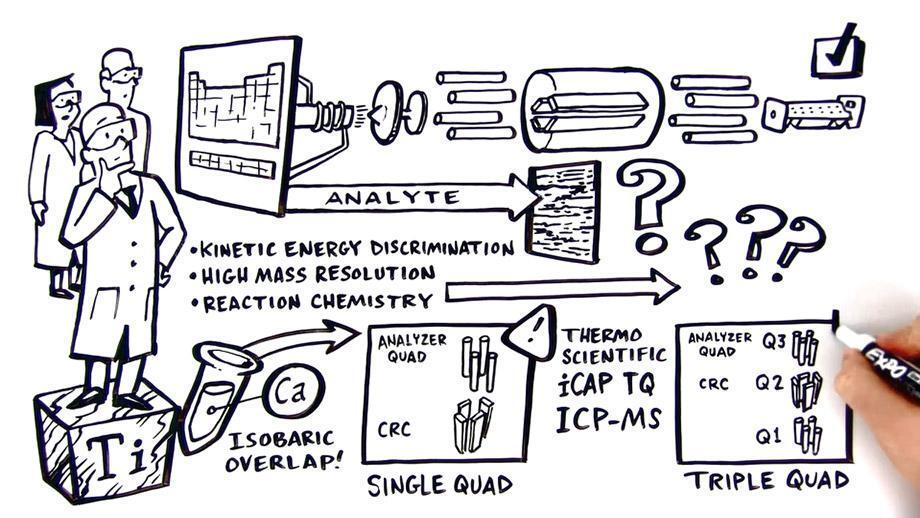Search Thermo Fisher Scientific
Inductively Coupled Plasma Mass Spectrometry (ICP-MS) Information
Inductively coupled plasma mass spectrometry (ICP-MS) is an elemental analysis technology capable of detecting most of the periodic table of elements at milligram to nanogram levels per liter. It is used in a variety of industries including, but not limited to, environmental monitoring, geochemical analysis, metallurgy, pharmaceutical analysis, and clinical research.
What is inductively coupled plasma?

The Inductively Coupled Plasma (ICP) is an ionization source that fully decomposes a sample into its constituent elements and transforms those elements into ions. It is typically composed of argon gas, and energy is "coupled" to it using an induction coil to form the plasma.
ICP-MS trace metals analysis workflow
ICP-MS systems are powerful analytical instruments; to obtain the best quality of data from these instruments, sample preparation and introduction methods must be performed with care. Also, data acquisition and processing should be thoroughly scrutinized.
In this section, you will:
- Learn which sample types can be analyzed by ICP-MS and what sample preparation and introduction conditions must be considered
- Know how ICP-MS data are generated inside the mass analyzer, prior to being collected for analysis
- Recognize and correct for factors that interfere with accurate ICP-MS data analysis
- Understand the systems and technology that drive ICP-MS systems
ICP-MS information subtopics
ICP-MS Sample Preparation
Learn how different sample types are prepared for analysis, and how instrument drift and background are accounted for during ICP-MS.
ICP-MS Data Analysis
Raw ICP-MS data are often calibrated to account for interferences and instrument drift. Understand which techniques, including spiking and standard additions, are used to calibrate data when plotting sample concentration curves.
ICP-MS Systems and Technologies
Find out which ICP-MS system is ideal for your lab by understanding how mass analyzers and magnetic sectors differ, how sample interference is filtered out, and how single ions are detected following selection.
Find out how the iCAP TQ ICP-MS can solve your challenges
We understand the challenges you face when analyzing complex sample matrices, which inspired us to redefine triple quadrupole technology with unique ease of use. Find out how the Thermo Scientific iCAP TQ ICP-MS, which includes triple quadrupole technology, significantly improves interference removal.
Environmental analysis by ICP-MS
Download our eBook for recommendations on getting started, best practices, and overcoming analytical challenges.
Videos and webinars
 Answers - Daniel Kutscher - Detecting Toxic Elements in Food
Answers - Daniel Kutscher - Detecting Toxic Elements in FoodSpeciation analysis (IC and ICP-MS) helps determine if food contains toxic elements, and if these can be transmitted through ingestion, negatively affecting human health.
 The Gold Standard in ICP-MS Performance
The Gold Standard in ICP-MS PerformanceThe Thermo Scientific™ ELEMENT 2 HR-ICP-MS and Thermo Scientific™ ELEMENT XR (magnetic sector) ICP-MS provide class-leading elimination of interferences for accurate and reliable quantitative multi-element analyses at trace levels, even without sampl
 Speed and Cost of Ownership
Speed and Cost of OwnershipThis webinar presents the innovative features and technologies for ICP (atomic spectroscopy) based analysis that provide the speed and confidence in analytical results and results in higher productivity.
Spectroscopy Elemental & Isotope Analysis Resource Library
Learn how elements and their isotopes provide information about sample origin and identity in our library of applications notes, scientific posters, webinars, and more.







